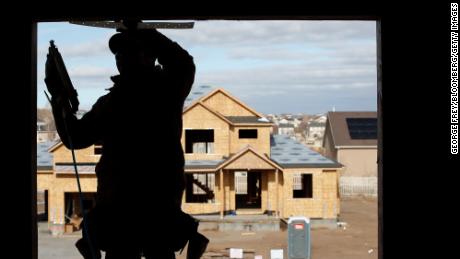This is how hard it is to buy a house right now
With such fierce competition, what does a wannabe home buyer have to do to land a house?
“Say, ‘Seller, we’ll give you $100,000 over [asking] price, and we’ll give it to you in cash,'” joked Javier Vidana, an agent with My Home Group in Phoenix. “Say those words and you got the house!”
Buyers who compete and get their bids accepted in this market often have extra savings, a higher tolerance for risk and greater flexibility, he said.
“They need to know this is what they are competing against,” he said. “If homeownership is one side of the cliff, it has become more perilous and difficult to make it to the other side.”
And demand has skyrocketed. About half of all listings are sold in a week, according to Redfin, and nearly half go for more than the asking price.
Bidding wars and price escalations are typical. Buyers are taking greater risks — including waiving the right to walk away without losing money if a home doesn’t appraise for the price offered or if an inspection turns up costly repairs that need to be made. Many are offering prices well above what sellers are asking, and providing “love letters” and lavish gifts to make their offers stand out. One buyer in New Jersey even threw in a stay at their Caribbean villa with their offer.
How do mere mortals — who don’t have hundreds of thousands in cash — buy a house in this competitive market?
Expand your search
Buyers who have been shut out repeatedly realize they either need more savings or lower expectations, said Vidana. House hunters unable to pay more should consider expanding their search area or opting for overlooked properties.
Over the past six months, his clients Matt and Hailey Melott lost bids on 10 homes. Each time the couple, who were moving from pricey San Jose, California, to more affordable Mesa, Arizona, fell short of other buyers who were bidding at least 10% over the list price and making all-cash offers with no contingencies.
“We got to the point where we were offering $450,000 on homes listed at $400,000, waiving the inspection and the appraisal and still losing out,” Matt Melott said. “We felt so hopeless. You either have cash in this market or you don’t.”
After months of Melott constantly hitting the “refresh” button on real estate search sites, a home caught his eye. It had been on the market for 16 days — an eternity in the areas he was scouring. It was priced in their range, but located in a neighborhood of higher priced homes where they hadn’t been looking.
“We were trying to figure out what was wrong with it,” said Melott.
The three-bedroom, 1,800-square-foot home with a pool had a dated interior, but ticked all their boxes. Best of all, it did not have a horde of buyers competing for it.
The Melotts offered list price, $436,000, had their offer accepted and the home appraised for that price.
“We are completely floored,” he said. “We got everything on our list.”
Take risks you can handle
While all buyers need to have plenty of funds, waiving traditional contingencies — like an inspection, appraisal, or the sale of a current home — can help make an offer more attractive. But it means buyers should be prepared to cover additional expenses that might come up, said Joseph M. Palmisano, a managing broker with Better Homes and Gardens in Concord, New Hampshire.
For example, if you opt to make your bid more competitive by waiving your inspection, you may need to pay for a new water heater or roof repair, he said. If the appraisal is less than what you offered, you might need to cover the gap out-of-pocket.
After a year of sharing an office while working from home, Nina Osegueda and William Austin decided to sell their condo in Herndon, Virginia, and buy a larger home in nearby Manassas. They hoped to make a standard offer with financing and inspection that would be contingent on the sale of their condo.
“But no one was accepting our contingency to sell,” said Osegueda. “Everything got rejected. People were offering no contingencies, no inspection, 10% to 20% over the asking price.”
So they switched gears, selling the condo first, which put them in a riskier, but more competitive position.
Their condo sold in a matter of days before it even hit the market, and they agreed they could rent it from the buyer for two months while they scrambled to buy a new home.
They made a more aggressive bid on a three-bedroom townhome, giving the sellers 12 hours to accept an offer that was $10,000 over the list price of $360,000 and waiving the inspection and appraisal. They risked losing the earnest money they paid as a deposit, by waiving the appraisal, and took a calculated risk to waive the inspection since it was a relatively new home. The offer was accepted.
“But it was a big adjustment,” she said. “We went from thinking we would be able to negotiate a price based on the sale of our condo to realizing we just need to make sure we have money to fix the house because we are forgoing an inspection.”
Erin and Kevin Lu also found the buying process to be a much different experience than they had expected. They wanted to buy their first home while interest rates were still low, plus they had a deadline to get out of their rental and into their first home: their son was due in April. They bid on a house in Phoenix listed at $299,000 by offering $310,000.
Not only were they outbid by $40,000 with an all-cash offer, they said, but out of the 10 offers on the house, five were all-cash. Plus, they learned the winning buyer was letting the seller live in the home for six months.
“There’s no way we can compete with that,” said Kevin Lu. “We can’t buy with cash and we need a place to live.”
To their astonishment, they got the second house they bid on. This time, they started with a more competitive offer, going $20,000 over on a home listed at $295,000. They also waived more contingencies.
“Waiving the appraisal, that was very risky,” said Erin Lu. “We asked ourselves what is worth it for a house? How much are we willing to deplete our emergency savings fund? We had to be prepared to lose our earnest money. We decided to take the chance.”
They did an inspection but waived issues that cost less than $500. The roof was repaired by the seller and the termite issue was addressed by the Lus.
“We had to take risks or we couldn’t compete,” said Kevin.
Offer something valuable to the seller
One couple did this while bidding on a five-bedroom house in Rumson, New Jersey, that was listed for $1.5 million. The buyers made a strong offer with no contingencies that was $50,000 over the asking price, said Corinne McCormack, an agent with Weichert who represented the buyers.
But they worried that still might not be enough.
The buyers had come to understand the sellers lived part-time in the Caribbean and thought an offer of a free stay at their rental property there might be appealing. So they wrote a letter to the seller talking about their shared love of life by the water and offered a stay at their St. John villa in the US Virgin Islands. It worked.
Short of adding luxurious extras, terms of the sale can sometimes be just as appealing to a seller as a higher price. For example, giving a seller more time to move out.
“The genius that is commonly missed is to try to find out what a seller wants,” said Palmisano. “Every seller wants more money, but in this seller’s market, a lot of sellers are buyers too and they want to rent back their house until they can move to their next house.”
He had a seller who accepted an offer from a buyer that would allow the seller to live in the guest house for a few months.
“You think the seller is king,” he said. “But that’s what a seller is willing to do in this market because they will be a buyer in the next round.”
![]()
















